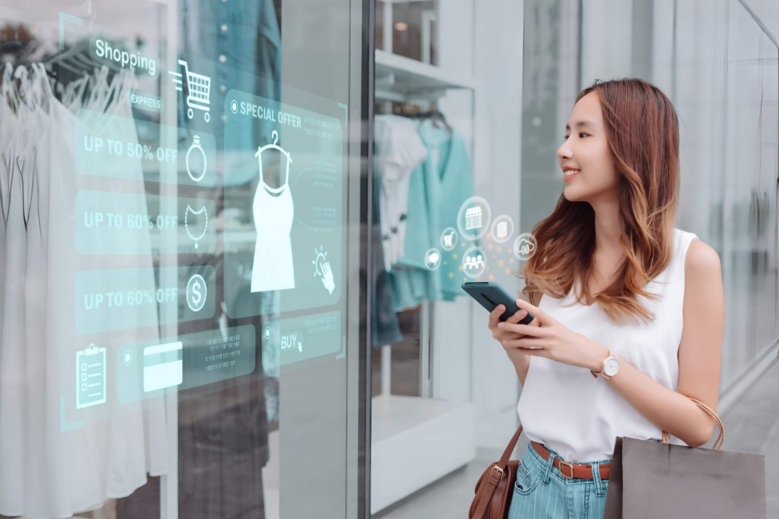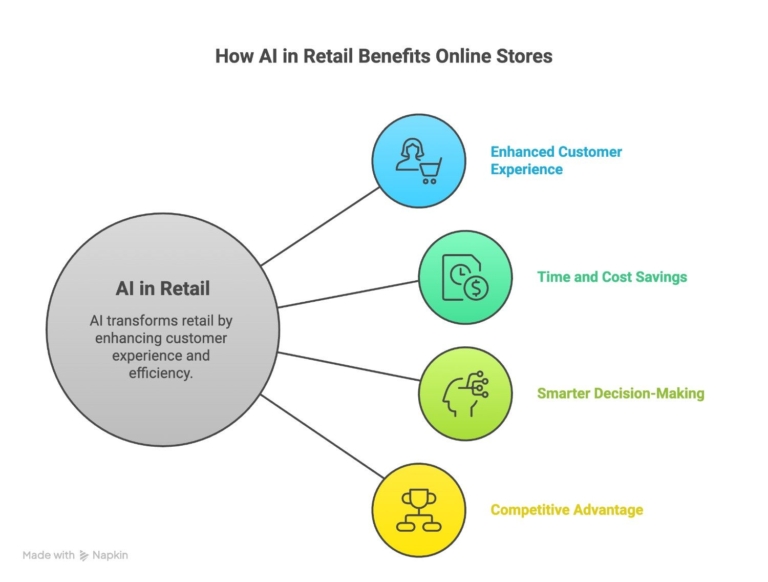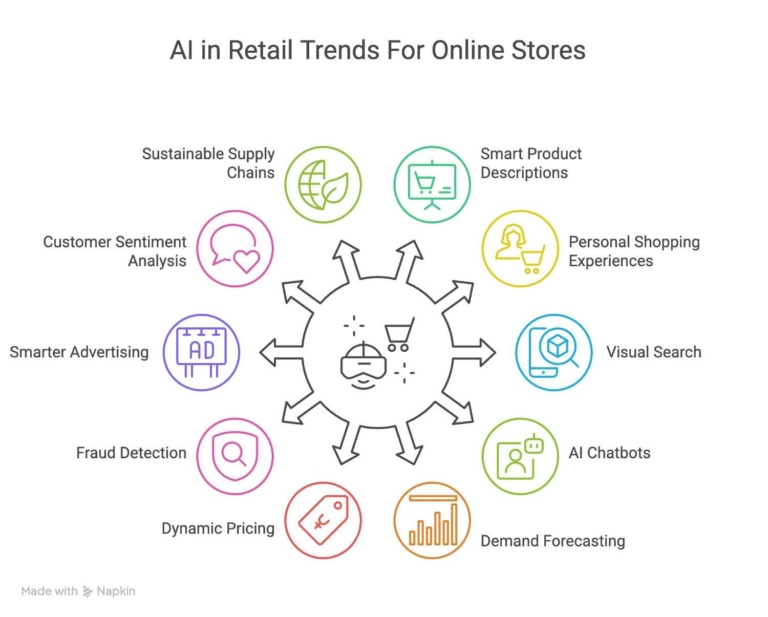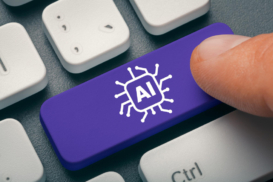Greetings! I'm Aneesh Sreedharan, CEO of 2Hats Logic Solutions. At 2Hats Logic Solutions, we are dedicated to providing technical expertise and resolving your concerns in the world of technology. Our blog page serves as a resource where we share insights and experiences, offering valuable perspectives on your queries.

A customer visits your online store, and within seconds, they see exactly what they’re looking for. The prices adjust in real-time based on demand, a friendly chatbot answers their questions instantly, and the checkout process is smoother than silk. This isn’t science fiction, it’s what AI is making possible for online retailers right now.
If you’re running an online store in 2025, ignoring artificial intelligence isn’t just risky. It could put you out of business. Your competitors are already using AI to create better shopping experiences, reduce costs, and boost sales. The question isn’t whether you should use AI in your retail business, but how quickly you can get started.
What Is AI in Retail?
Let’s keep this simple. AI in retail means using computer programs that can learn and make decisions to improve your online store. Think of it as having a super-smart assistant that never sleeps, never takes breaks, and gets better at helping your customers every single day.
This technology works both online and in physical stores. When it comes to online retailers, it’s like having a personal shopping assistant for every single customer who visits your website.
Sell More with a Store That Understands Your Customers
How AI in Retail Benefits Online Stores
Before diving into specific trends, let’s understand why AI matters for your business:

Better Customer Experience: AI helps you show each customer exactly what they want to see, making shopping easier and more enjoyable.
Save Time and Money: Automated processes mean you spend less time on repetitive tasks and more time growing your business.
Smarter Decisions: Instead of guessing what products to stock or how to price them, AI uses real data to help you make better choices.
Stay Competitive: While your competitors struggle with manual processes, you’ll be serving customers faster and more efficiently.
Top 10 AI in Retail Trends for 2025

1. Smart Product Descriptions and Marketing Content
Writing product descriptions for hundreds or thousands of items is exhausting. AI can now create compelling, unique descriptions for each product in seconds. These aren’t generic, copy-paste descriptions. They’re tailored to highlight what makes each product special.
The same technology helps create email campaigns, social media posts, and even blog content that speaks directly to your customers’ needs and interests.
2. Personal Shopping Experiences for Everyone
Remember when only luxury stores could offer personal shopping services? AI changes that. Now, every customer gets a personalized experience based on their browsing history, purchase patterns, and preferences.
When someone visits your store, AI shows them products they’re most likely to buy, suggests complementary items, and even adjusts the website layout to match their shopping style.
3. Visual Search and Image Recognition
Your customers can now take a photo of something they like and find similar products in your store instantly. See a dress in a magazine? Snap a photo, and AI will show you similar styles available for purchase.
This technology also helps with inventory management. AI can recognize and categorize products from photos, making it easier to track what you have in stock.
4. AI Chatbots and Virtual Shopping Assistants
Gone are the days of basic chatbots that could barely understand simple questions. Today’s AI assistants can have natural conversations, understand context, and provide helpful recommendations just like a human sales associate would.
AI chatbots can handle everything from answering product questions to processing returns, and they’re available 24/7 without coffee breaks or sick days.
5. Demand Forecasting and Smart Inventory Management
Running out of popular products or getting stuck with items nobody wants is every retailer’s nightmare. AI analyzes patterns in your sales data, seasonal trends, and even external factors like weather or social media buzz to predict what you’ll need and when.
This means fewer disappointed customers and less money tied up in products that won’t sell.
6. Dynamic Pricing That Adjusts Automatically
AI can monitor your competitors’ prices, track demand for your products, and automatically adjust your pricing to maximize sales and profits. If demand is high, prices can increase slightly. If you need to move inventory quickly, prices can drop to attract more buyers.
This happens in real-time, so you’re always competitive without constantly monitoring and manually changing prices.
7. Fraud Detection and Loss Prevention
Online fraud costs retailers billions every year. AI systems can spot suspicious patterns in transactions that humans might miss. This can be like unusual purchasing behavior, mismatched shipping and billing addresses, or patterns that match known fraudulent activities.
This protects both your business and your legitimate customers from fraudulent transactions.
8. Smarter Advertising and Customer Targeting
Instead of showing the same ads to everyone, AI helps you target the right customers with the right message at the right time. It analyzes customer behavior to determine who’s most likely to buy specific products and when they’re most likely to make a purchase.
This means your advertising budget goes further and generates better results.
9. Understanding Customer Feelings and Feedback
AI can analyze customer reviews, social media mentions, and support conversations to understand how people really feel about your products and services. It can identify common complaints, spot trending topics, and even detect when customers are getting frustrated before they leave negative reviews.
This insight helps you improve your products and customer service proactively.
10. Sustainable and Efficient Supply Chains
Customers increasingly care about sustainability, and AI helps you optimize your supply chain to reduce waste and environmental impact. It can find the most efficient shipping routes, predict when to reorder products to minimize waste, and even help you work with suppliers who share your sustainability goals.
Grow Without Growing Your Workload
Should You Implement AI in Retail?
The short answer is yes, but let’s be practical about it. Here are some factors to consider:
Your Budget: AI solutions range from affordable monthly subscriptions to custom-built systems. Start small with tools that address your biggest pain points.
Your Data: AI works better when you have customer data to learn from. If you’re just starting out, begin with simple tools and build up your data collection.
Integration Needs: Consider how AI tools will work with your existing website, inventory system, and other business tools.
Potential Risks: Be aware of data privacy requirements, don’t rely too heavily on any single system, and ensure AI recommendations align with your brand values.
How to Choose the Right AI Retail Partner
Implementing AI doesn’t have to be overwhelming. Here’s what to look for in a partner:
Experience with Retail: Choose someone who understands the unique challenges of online retail, not just general AI development.
Clear Communication: Your partner should explain things in plain English and help you understand how AI will benefit your specific business.
Ongoing Support: AI systems need monitoring and updates. Make sure your partner offers continued support, not just initial setup.
Proven Results: Look for case studies and examples of successful implementations with businesses similar to yours.
Let’s explore how AI can work for your retail business.
Conclusion: Grow Your Retail Business with AI
The future of retail is already here, and it’s powered by artificial intelligence. AI offers practical solutions that can make a real difference in your business. The key is to start with one or two areas where AI can have the biggest impact on your business, then expand from there.
Consider beginning with AI-powered product recommendations or chatbots. These typically offer quick wins and help you build confidence with AI technology. From there, you can explore more advanced features like dynamic pricing or visual search.
Need help implementing AI solutions for your retail business? Our team specializes in making AI accessible and affordable for online stores of all sizes. Contact us for a free consultation to discover which AI trends could transform your business.

Related Articles







